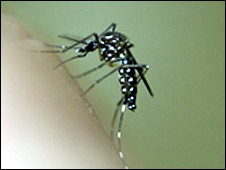 The Sri Lankan government is threatening to jail people who do not clean up water puddles in an effort to combat a rise in cases of dengue fever.
The Sri Lankan government is threatening to jail people who do not clean up water puddles in an effort to combat a rise in cases of dengue fever.
The disease is spread by mosquitoes, which breed on stagnant water.
The authorities are also importing bacteria from Cuba to kill the larvae of the mosquitoes, and are spraying their breeding grounds.
The government says more than 160 people have died from dengue in 2009 – more than double last year’s figure.
Alarm
Dengue fever is a flu-like illness spread by the bite of an infected Aedes mosquito.
The disease is most prevalent during the annual monsoons, when heavy rainfall leave puddles of stagnant water where the insects breed.
Government medical official Dr Sankalpa Marasinghe told the BBC Sinhala service that there is a sense of alarm about the disease.
"This is because the mortality rate in relation to the infection rate is very high. There have been 163 deaths and 14,750 people infected this year. The spread of the disease is around Sri Lanka, not localised. There are doubts of the strain of the virus and there could be mutations," he said.
"That is why the government is taking various measures, imposing laws and regulations, to keep the environment clean and reduce mosquito breeding. There are direct interventions by the ministries of environment, health and education."
Health officials blame the spread of the disease on people’s carelessness in not properly cleaning their properties and eliminating mosquito breeding grounds.
In recent weeks government inspectors have warned people in Colombo and outside the capital that they must get rid of mosquito breeding grounds within two weeks or face fines of up to 25,000 rupees ($220) or a six month jail term.
Dr Marasinghe said that the Cuban bacterium would be useful for large marshy areas. "But there is the problem of feasibility," he said, "since the majority of mosquito breeding occurs in as little as 5mm of water – such as in plant pots."
Symptoms
Dengue fever usually begins suddenly with a high temperature, rash, severe headache, pain behind the eyes and in the muscles and joints.
The severity of the joint pain has given the disease the nickname "breakbone fever". Nausea, vomiting and loss of appetite are common.
In January Austrian scientists said that people could be protected from dengue by infecting mosquitoes carrying the disease with a parasite which halves their lifespan.
They said that only older mosquitoes pass on dengue – so killing them could cut disease.
Many thousands of cases of dengue fever occur worldwide each year, mainly in tropical countries.
(For updates you can share with your friends, follow TNN on Facebook and Twitter )
